National Aggregate
Five-Year Summary: July 2011 to June 2016
Tables and graphs report on cancer screening services provided through the program in a recent 5-year period. The data represent clinical services funded directly through the NBCCEDP as reported in the April 2017 submission of the NBCCEDP Minimum Data Elements (MDE).
National aggregate data are typically used to report results from the program and as a standard to compare results of grantee programs. Comparing data across grantee programs is not advised due to extensive variation across programs. For information on interpreting the data, refer to Screening Program Data. For information on the program, refer to About the Program.
Screening Totals by Year
Number of Women Screened by Year
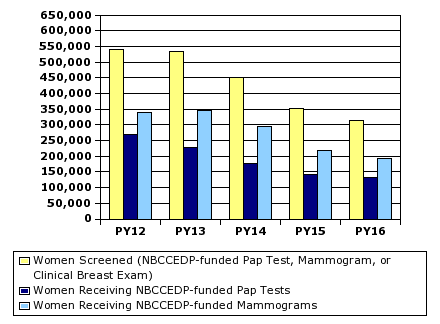
This bar graph illustrates the number of women who received NBCCEDP-funded screenings by program year from July 2011 to June 2016.
Program year (PY) is defined as July 1 through June 30. For example, “PY17” represents July 1, 2016 through June 30, 2017.
Program Overview
| Category | Number |
|---|---|
| Women served [1] | 1,578,640 |
| Women screened [2] | 1,513,114 |
| Women receiving Pap tests | 843,808 |
| Women receiving mammography | 978,382 |
Each category reports counts of unduplicated women receiving services within the 5-year period. Women may be counted in more than one category.
1: Women served includes women receiving any NBCCEDP-funded screen or diagnostic procedure.
2: Women screened includes women receiving any NBCCEDP-funded screen (mammography, clinical breast exam, or Pap test).
Data source: April 2017 submission of NBCCEDP Minimum Data Elements (MDE).
Cervical Cancer Screening
Distribution of Women Receiving Pap Tests by Race/Ethnicity
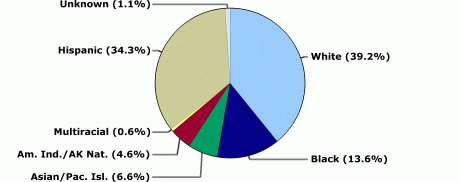
This pie chart illustrates the distribution of 843,808 women receiving an NBCCEDP-funded Pap test from July 2011 to June 2016 by race and ethnicity.
Distribution of Women Receiving Pap Tests by Age
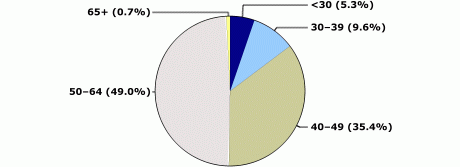
This pie chart illustrates the distribution of 843,808 women receiving an NBCCEDP-funded Pap test from July 2011 to June 2016 by age.
| Category | Number |
|---|---|
| Pap tests provided | 973,898 |
| Pap tests with abnormal results [1] | 32,346 |
| Percentage of Pap tests with abnormal results | 3.3 |
| Age-adjusted percentage [2] | 3.1 |
| Cervical cancers or premalignant cervical lesions [3] | 21,273 |
| CIN1 or LSIL | 13,175 |
| CIN2 or worse [4] | 8,098 |
| Rate of CIN2 or worse detected per 1,000 Pap tests [4] | 8.3 |
| Age-adjusted rate per 1,000 Pap tests [2] | 7.7 |
1: Abnormals include Pap test results of: low-grade squamous intraepithelial lesion (LSIL), high-grade squamous intraepithelial lesion (HSIL), atypical squamous cells of undetermined significance – cannot exclude HSIL (ASC-H), atypical glandular cells (AGC), and squamous cell cancer.
2: Adjusted to the age distribution of NBCCEDP participants having Pap tests performed in calendar year 2000.
3: Includes LSIL, HSIL, cervical intraepithelial neoplasia (CIN)1, CIN2, CIN3, carcinoma in situ (CIS), and invasive cervical cancer.
4: Includes HSIL, CIN2, CIN3, CIS, and invasive cervical cancer.
Table includes only NBCCEDP-funded Pap tests. An additional 17,903 women, not included above, were diagnosed with LSIL, HSIL, CIN1, CIN2, CIN3, CIS, or invasive cervical cancer through the NBCCEDP following a Pap test funded through another source.
Breast Cancer Screening
Distribution of Women Receiving Mammograms by Race/Ethnicity
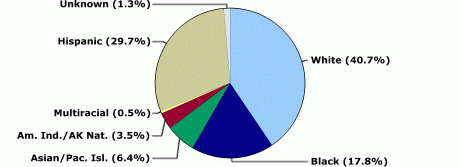
This pie chart illustrates the distribution of 978,382 women receiving an NBCCEDP-funded mammogram from July 2011 to June 2016 by race and ethnicity.
Distribution of Women Receiving Mammograms by Age
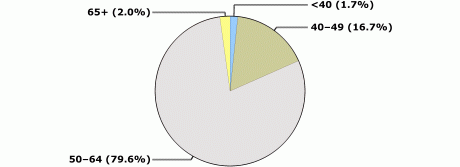
This pie chart illustrates the distribution of 978,382 women receiving an NBCCEDP-funded mammogram from July 2011 to June 2016 by age.
| Category | Number |
|---|---|
| Mammograms provided | 1,406,899 |
| Mammograms with abnormal results [1] | 218,056 |
| Percentage of mammograms with abnormal results | 15.5 |
| Age-adjusted percentage [2] | 16.0 |
| Breast cancers detected [3] | 15,542 |
| Rate of breast cancers detected per 1,000 mammograms | 11.0 |
| Age-adjusted rate per 1,000 mammograms [2] | 11.3 |
1: Abnormals include mammogram results of: suspicious abnormality, highly suggestive of malignancy, and assessment incomplete (further imaging studies or film comparisons required).
2: Adjusted to the age distribution of NBCCEDP participants 40 years of age and older having mammograms performed in calendar year 2000.
3: Breast cancers include invasive breast cancer, ductal carcinoma in situ (DCIS), and other in situ excluding lobular carcinoma in situ (LCIS).
Table includes only NBCCEDP-funded mammograms provided to women age 40 and older. An additional 5,407 women, not included above, were diagnosed with CIS (other), DCIS, or invasive breast cancer through the NBCCEDP following a mammogram funded through another source.
- Page last reviewed: September 11, 2017
- Page last updated: September 11, 2017
- Content source:
- Maintained By:


 ShareCompartir
ShareCompartir